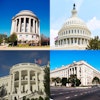 Sean Heather
Sean Heather
Senior Vice President, International Regulatory Affairs & Antitrust, U.S. Chamber of Commerce
Published
July 17, 2025
For half a century, a predictable and stable approach to merger enforcement has helped supercharge our economy by enabling American companies to plan, invest, and innovate. Unfortunately, the Federal Trade Commission’s (FTC) deeply misguided lawsuit against Meta seeks to upend the very certainty the business community and our economy rely on.
With the closing arguments wrapped up, a judge will now decide if Meta must unwind its acquisitions of Instagram (2012) and WhatsApp (2014). Such a decision would be unprecedented. Never has the government tried, nor a court agreed to, unwind a merger, let alone two mergers that were consummated more than a decade ago.
A Look Back
Since 1976, the Hart-Scott-Rodino Act has brought certainty to America’s merger review process. Under the Act, merging companies file a notice that allows the government to review the proposed deal in advance of closing. In the years before Hart-Scott-Rodino, the government would find out about mergers after they were consummated, resulting in an often-messy process of the government attempting to unwind them. Today, if the initial antitrust review raises potential concerns, companies must produce more detailed data through a second, more extensive review, and if the government doesn’t object, the deal can close.
For nearly 50 years, this process has worked well both for the government and the companies involved in the deal. Although the government can still challenge a merger after the fact, in practice, that almost never happens. As a federal court recently explained, “it would be a substantial step to find that an acquisition violated the Sherman Act after it was reviewed and approved by federal antitrust regulators.” In the handful of cases where it has happened, challenges have come within the first few years following the completed merger. In the Meta case, despite having carefully reviewed and raised no objections to either purchase at the time, the FTC now wants a “do-over” more than a decade later.
Need for Predictability
In the words of Chief Justice John Marshall: “[it] would be utterly repugnant to the genius of our laws [if an action could] be brought at any distance of time.”
His words still resonate through our legal system 220 years later. For the enforcement of many laws, there is a statute of limitations imposed to prevent abuse that comes with efforts to litigate matters in the distant past. While there is no formal statute of limitations governing a challenge to a merger, common sense has dictated that challenges made more than a few years after the merger is consummated stretches credibility. As the Chamber has explained in an amicus brief in a parallel case against Meta brought by the state of New York that was ultimately dismissed: "Businesses, their shareholders, and their customers deserve to know that decades-old transactions will not be unwound … The insecurity of knowing that the structure of an established enterprise is forever subject to judicial revision would cast a cloud over all business dealings down the line.”
Ironically, when the FTC justified its decision to keep the much-maligned Biden-era merger guidelines, for now, it explained that: “stability across administrations of both parties has thus been the name of the game … no business can plan for the future on the basis of guidelines they know are one election away from rescission.” The business community holds a small fraction of interest in the stability of non-legally binding merger guidelines in comparison to the need to know that mergers will not be unwound years into the future.
After the FTC decided not to object to the purchases of Instagram and WhatsApp, the company relied on those decisions to invest over the years billions of dollars into improving and scaling the operations of Instagram and WhatsApp. Every day, in every industry, companies plan, invest, and integrate acquisitions in reliance upon such decisions. Given that the FTC is now looking to reverse course and look back more than a dozen years, what prevents today’s enforcers from looking back even further in time, or future enforcers from second-guessing today’s decisions?
Any Theory Will Do
The FTC’s theory to support divestiture appears to rest upon the thinnest factual grounds. During the trial, the FTC repeatedly touted a handful of old emails in which Facebook’s executives at the time expressed concern about potential competition from mobile apps as motivation for the acquisition. These time capsules that offer a glimpse into the mindset of executives fall woefully short of the legal standard necessary to find a violation under merger law. The law is concerned with the impact a merger has on competition, not what any executive might have said or thought.
Far more importantly, the social media marketplace has evolved dramatically since 2012. Meta has been forced to spend billions to improve all of its product offerings to give consumers more options. How much has the world changed since 2012? Apple unveiled iPhone 5, YouTube’s most watched video was Psy’s Gangham Style, and the New York Giants won the Super Bowl.
Since 2012, multiple new social media companies have launched, grown exponentially, and/or undergone ownership changes, including TikTok (launched 2016), Truth Social (2022), Twitter/X (ownership change 2022), LinkedIn (ownership change 2016), and Snapchat (launched 2011). At the same time, niche social networks have arisen that cater to specific interests and communities, further diversifying the market.
Looking Ahead
There is no reason to believe that these transactions from more than a decade ago will prevent the social networking landscape from continuing to evolve. Emerging technologies, such as virtual reality, augmented reality, and artificial intelligence, are likely to transform how people interact online.
At a minimum, these developments demonstrate the dynamism of today’s social media—and that the FTC should allocate its scarce resources to something other than second-guessing itself and imperiling the nation’s stable, predictable, and successful merger control regime.
About the author

Sean Heather
Sean Heather is Senior Vice President for International Regulatory Affairs and Antitrust.






